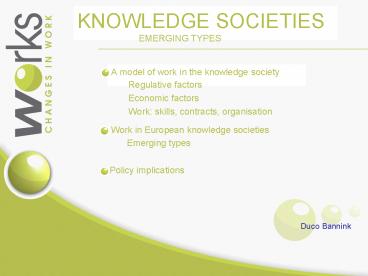KNOWLEDGE SOCIETIES PowerPoint PPT Presentation
1 / 14
Title: KNOWLEDGE SOCIETIES
1
KNOWLEDGE SOCIETIES
EMERGING TYPES
- A model of work in the knowledge society
Regulative factors Economic factors Work skills,
contracts, organisation
Work in European knowledge societies
Emerging types
Policy implications
Duco Bannink
2
A MODEL OF WORK IN THE KNOWLEDGE SOCIETY
- main WORKS research interest
- nature of work in the knowledge society
- do specific patterns emerge?
- starting point
- how is the nature of work produced?
- main mechanism company strategy, responding to
- policy context
- economic context
3
A MODEL OF WORK IN THE KNOWLEDGE SOCIETY
4
A MODEL OF WORK IN THE KNOWLEDGE SOCIETY
- economic context companies preferences
- market flexibility and demand volatility
- affects quantitative labour demand
- affects employees dependency from market
conditions and employer - knowledge intensity and production complexity
- affects qualitative labour demand
- affects company dependency from employees
knowledge and skills
5
A MODEL OF WORK IN THE KNOWLEDGE SOCIETY
- policy context companies options
- two main modes of accommodating labour supply and
demand - coordinated collective decision-making, high
specificity, low flexibility, deep skills - uncoordinated individual decision-making, low
specificity, high flexibility, quick innovation
6
A MODEL OF WORK IN THE KNOWLEDGE SOCIETY
- policy context companies options
- three main modes of social protection
- social-democratic
- public provision, highly inclusive, strong social
protection - liberal
- private provision, highly selective, weak social
protection - corporatism
- semi-public provision, highly selective, strong
social protection - NMS and Latin Rim variants more selective and
weaker protection
7
A MODEL OF WORK IN THE KNOWLEDGE SOCIETY
- regimes policy and economy connected
- specific policies support specific types of
economic structure and v.v. - e.g. industrial production in low wage countries,
product design in high skill countries - companies adjust strategies to options
- ?
- policy context adjusts to economic structure
8
A MODEL OF WORK IN THE KNOWLEDGE SOCIETY
- increased requirements of flexibility and
knowledge intensity in KS - but regimes lag behind regimes of the
industrial era structure work in the knowledge
society
9
A MODEL OF WORK IN THE KNOWLEDGE SOCIETY
comparisons of same branch/business function in
different countries different branch/business
function in same country
10
RESULTSWORK IN EUROPEAN KNOWLEDGE
SOCIETIESEMERGING TYPES
- responses to economic context lead to
differentiated company strategies on the basis of
business function primarily, less branch - IT and design
- high skill requirements, high demand volatility
(2) - elaborate ILMs and strong skill formation (3a),
strong worker autonomy in working hours (3b) - production
- low skill requirements, high demand volatility
(2) - no career paths and lacking skill formation (3a),
low autonomy in WTA (3b)
11
RESULTSWORK IN EUROPEAN KNOWLEDGE
SOCIETIESEMERGING TYPES
12
RESULTSWORK IN EUROPEAN KNOWLEDGE
SOCIETIESEMERGING TYPES
differences in regulation lead to value chain
restructuring or internal reorganisation labour
costs VCR/outsourcing towards CEEC and low-wage
countries labour flexibility VCR/outsourcing
towards weaker regulation branches (e.g. Italian
clothing production to domestic sector) labour
regulation VCR/outsourcing to China, Africa,
etc. import duties VCR/outsourcing to other
trade areas (e.g. to Middle America for U.S.
market) next to regulation-directed outsourcing
also some economic outsourcing market
proximity note outsourced low cost work may be
upgraded over time required stronger labour
regulation and skill investments are produced
privately
13
RESULTSWORK IN EUROPEAN KNOWLEDGE
SOCIETIESEMERGING TYPES
- gradual convergence of dualised European
industrial production and labour market? or
business function specialisation? - low wage/low skill-regimes in new members states
- increased employment
- highly flexible production and weak worker time
autonomy - but some gradual upgrading of knowledge intensity
of production - high wage/high skill-regimes in old member states
- decreasing production employment
- maintained knowledge intensive employment
- also highly flexible production, but stronger
worker time autonomy - danger of further labour shedding, also highly
qualified labour
14
POLICY IMPLICATIONS
gradual convergence of dualised European
industrial production and labour market? or
business function specialisation? main question
for European knowledge society policies gtgt
towards skill formation in corporatist, branch-
or firm-bound strategies? gtgt towards
individualised activation as in Lisbon
strategy? gtgt towards retrenchment of social
protection and deregulation of labour? gtgt towards
stronger labour regulation and increased social
protection? next report of WORKS WP-team
addresses these questions

